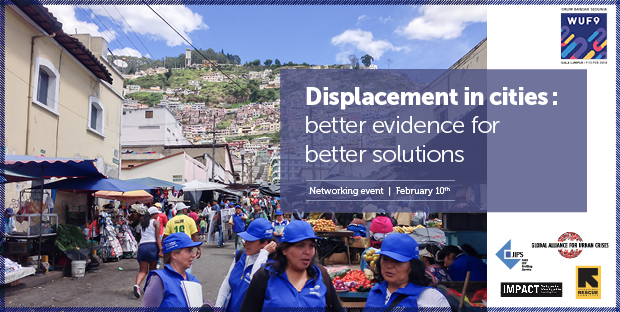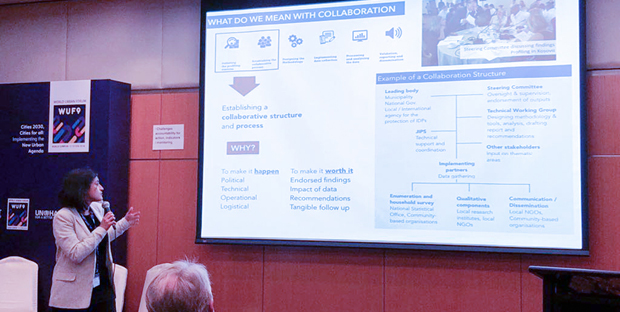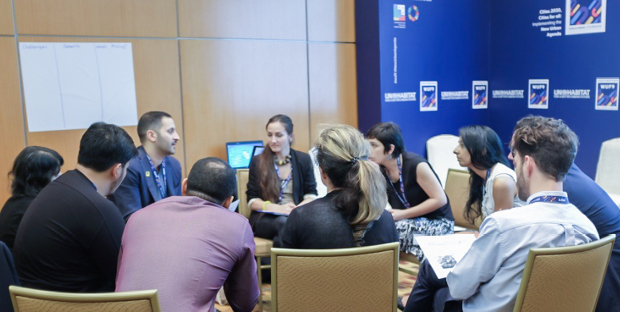Displacement high on agenda at the 9th World Urban Forum
JIPS joined 22,000 people from 165 countries, including many representatives of local governments, at the 9th World Urban Forum (WUF) in Kuala Lumpur, Malaysia in February. This major event served as opportunity to revisit the goals of the New Urban Agenda endorsed two years ago, calling for cities to be planned and developed in an inclusive and sustainable way, leaving no one behind including the displaced.
At JIPS we used this opportunity to organise an event to bring the attention of participants to how we can ensure evidence leads to better solutions for displaced populations. We would challenge the next WUF to aim for a more nuanced understanding of forced displacement in cities, but found it great to be part of the many stimulating discussions as well as to make new connections with diverse people working to improve the cities where displaced people live alongside their hosts, including community representatives and mayors.

Great to see displacement at the forefront of the WUF9
Unlike in past events of its kind, the WUF brought humanitarian and displacement crises to the forefront of the urban discussion. While the increase of migrants and forcibly displaced people living in cities is often portrayed negatively in the media, examples presented at the WUF highlighted how this phenomenon can also benefit the development of the city as a whole. Advanced planning, national policy frameworks, solid evidence-gathering, and programs that take into account people’s needs are, however, critical to achieve that.
The Forum also offered space for government agencies to share their experiences. To mention just two examples, we heard from the local government in Gaziantep, Turkey about how they provided targeted services to refugees along with social programs to the host populations, and from the Ministry of Refugees and Repatriation in Afghanistan how they implemented a national framework for the protection of returning refugees to restore social cohesion overall.

Isis Nunez (JIPS) presenting collaborative profiling to WUF9 participants.
Better evidence is needed – but how do we do that?
Inclusive planning requires comprehensive evidence that includes the situation of displaced populations. But the methods for doing this often remain as an afterthought or are left to technical experts to decipher.
The event we organised “Displacement in Cities: Better Evidence for Better Solutions” addressed this gap head-on by discussing three different approaches to gathering information on displaced populations:
- Context analysis toolkit presented by the International Rescue Committee (IRC) that combines a detailed stakeholder analysis with some primary data collection to get a basic overview of the actors involved in a displacement setting;
- Settlement-based assessments shared by IMPACT Initiatives that compare data on multiple sectors in different districts of a city and new methods from their AGORA Initiative pilot projects; and
- Displacement profiling explained by JIPS that brings partners together to create a comprehensive overview of a displacement situation through a combination of quantitative and qualitative methods.
The lively discussions that followed signalled broad interest and highlighted the complementarity over the differences between the methods presented, addressing the multi-faceted question: what evidence do cities need to respond to displacement? Main points that participants underlined:
- Complementarity: while the methods differ in terms of how long they typically take to be implemented (from roughly 2-3 weeks for the context analysis to around 6 months for profiling), there are clear linkages between them. The context analysis provides key inputs to a medium-term assessment that could in turn inform a large-scale profiling exercise. The approaches share the need to unpack the complexity of urban contexts and the benefits of collaborating with local and national actors to make sure the evidence on displacement is relevant for their responses, not just those of international actors.
- Need for practical and specific information, including on needs and capacities of displaced persons: recalling his own experience as a refugee from Estonia in the 1940’s, Mr. Ilmar Reepalu, former Mayor of Malmo, Sweden and current Chair of International Committee of SALAR (Swedish Association of Local Authorities and Regions) reminded us that we should not collect evidence that depicts the displaced as a faceless group. When planning for arrivals of new populations, mayors need specific information, such as on immunisations, languages people speak or their educational background, but also on their diverse capacities.
- Importance of data not just for informing humanitarian response but also for development actors working on recovery planning: for Ms. Katja Schaefer, a Human Settlements Officer from the UN-Habitat Regional Office for Arab States, however, this calls for data that can inform more long-term solutions for cities, and for humanitarians to build on existing systems. This for Ms. Schaefer requires both involving local actors and building the capacity of local government and communities to be part of the data collection and to achieve a more accurate picture of their situations. She like Mr. Reepalu furthermore highlighted the need to have a people-centric approach regardless of the type of response needed to better understand the differences in vulnerability within displaced populations.
- Need for looking deeper than the traditional international actors to understand the stakeholders relevant for decision-making in cities: Ms. Leah Campbell, Senior Researcher with the Active Learning Network for Accountability and Performance (ALNAP), gave an overview of methodologies used for understanding urban contexts based on a review to be published in March 2018. This also revealed the need prioritising an analysis of the context before planning any interventions to avoid imposing assumptions from elsewhere.

Group discussion to reflect on experiences implementing innovative approaches to understanding displacement in cities WUF9.
In short, what can we learn from these discussions?
Overall, the event demonstrated the need for context-specific, people-centric and collaborative approaches. At JIPS we look forward to expanding the conversation in 2020 and especially encourage a next WUF to incorporate a more nuanced understanding of forced displacement into discussions on humanitarian and development interventions in cities in crisis.
This could be through methods of engaging with displaced communities in cities, how the experiences of IDPs, refugees and migrants are more similar in some places than others, how to bring in national statistics offices together with local government in discussions on evidence-gathering for better reporting of displacement in official statistics in line with Sustainable Development Goals, or how to analyse progress towards durable solutions in areas of displacement, return or resettlement.
The Global Alliance for Urban Crises already works to contribute to these discussions. With over 70 member organisations spanning urban planning, local government, built environment, humanitarian, and development sectors, the Alliance highlights collaboration across and within sectors and agencies as the core ingredient to responding to urban crises in a coherent and holistic way. This message resonates with JIPS’ own work which has demonstrated that collaboration early on in the process for gathering evidence on displacement leads to a shared understanding that enables responses to be planned together.